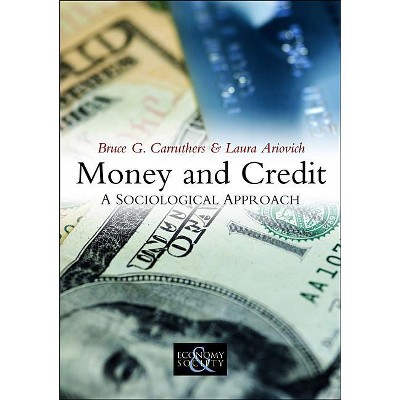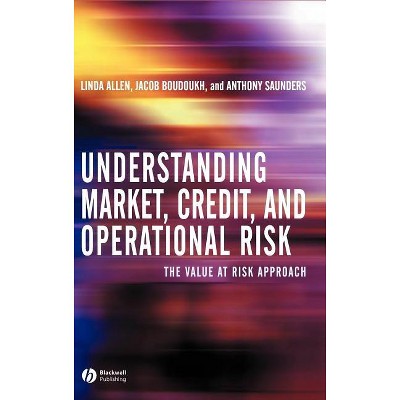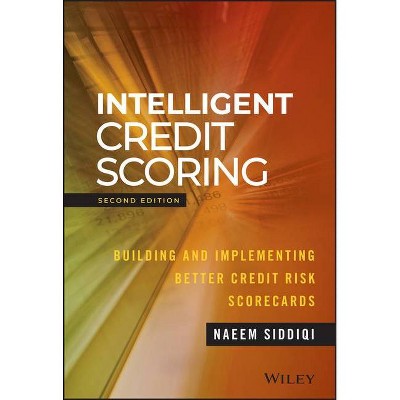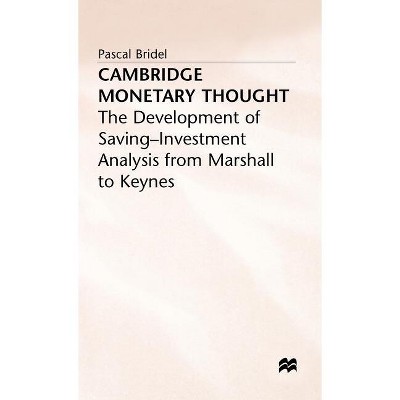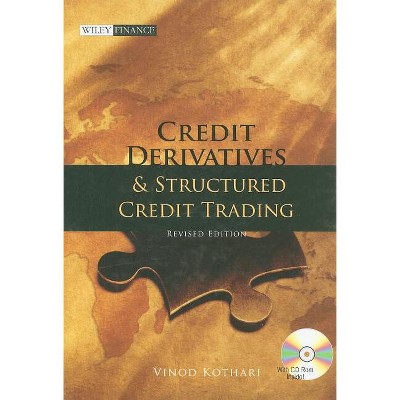Sponsored

Genres of the Credit Economy - by Mary Poovey (Paperback)
$37.00
In Stock
Eligible for registries and wish lists
Sponsored
About this item
Highlights
- How did banking, borrowing, investing, and even losing money--in other words, participating in the modern financial system--come to seem likeroutine activities of everydaylife?
- About the Author: Mary Poovey is the Samuel Rudin Professor in the Humanities andprofessor of English at New York University and author of, most recently, A History of the Modern Fact: Problems of Knowledge in the Sciences of Wealth and Society.
- 496 Pages
- Business + Money Management, Finance
Description
Book Synopsis
How did banking, borrowing, investing, and even losing money--in other words, participating in the modern financial system--come to seem likeroutine activities of everydaylife? Genres of the Credit Economy addressesthis question by examining the history of financial instruments and representations of finance in eighteenth- and nineteenth-century Britain.Chronicling the process by which some of our most important conceptual categories were naturalized, Mary Poovey explores complex relationships among forms of writing that are not usually viewed together, from bills of exchange and bank checks, to realist novels and Romantic poems, to economic theory and financial journalism. Taking up all early forms of financial and monetarywriting, Poovey argues that these genres mediated for early modern Britons the operations of a market system organized around credit and debt. By arguing that genre is a critical tool for historical and theoretical analysis and an agent in the events that formed the modern world, Poovey offers a new way to appreciate the character of the credit economy and demonstrates the contribution historians and literary scholars can make to understanding its operations.
Much more than an exploration of writing on and around money, Genres of the Credit Economy offers startling insights about the evolution of disciplines and the separation of factual and fictional genres.
Review Quotes
""Genres of the Credit Economy" is a phenomenal accomplishment. Tracking the intersecting and diverging paths of economic, imaginative and monetary genres of writing about (and mediating) value from the late-seventeenth through the nineteenth centuries, the book provides a stunningly original account of how the disciplines of literature and economics emerged, what they value, and the critical situation in which literary studies, in particular, currently finds itself. Working within and dynamically expanding the boundaries of the 'new economic criticism, ' "Genres of the Credit Economy" both provides a path-breaking study in the history of modern practices of writing and exemplifies a provocative new mode of reading, one which Poovey convincingly argues can help us answer the most pressing questions of the discipline: What is the function of literary study? What is its value? As timely in the questions it raises as it is rich in the history it unfolds, the archive it assembles, and the argument it frames", Genres of the Credit Econom"y seems destined to become a defining work in the fields of literary and economic study, genre theory, and the history of the disciplines."
--Ian Baucom, Duke University
"Mary Poovey relocates and revives the question of literary value by recasting it as one about kinds of writing in emergent credit-based society. Her placement of literature and its institutions on a huge spectrum along with economics, credit, and political economy aligns it with systems of finance as a vehicle for managing value in and of itself. Poovey joins matchless scope, intellectual vigor, and argumentative force to stunning originality."
--John Bender, Stanford University
"No one with an interest in the current state of literary studies will be able to ignore this book. No one with an interest in the histories of the disciplines of economics and literary criticism will fail to learn from this book. Everyone with an interest in the development of the humanities will be in debt to this book. It lays bare the traffic between money and writing, fact and fiction, literature and economy, and value and knowledge in ways that will alter our understanding of modernity. Its most powerful analytic insights are produced by an extraordinarily brilliant conception of genre which allows Poovey to chart the warps and wrinkles in the development of the Credit Economy, tracking the incommensurability of ways of valuing and representing value. Not since Foucault began to unlock the history of systems of thought through the incision of his concept of discourse has there been an analytic intervention of such power and fecundity. "Genres of the Credit Economy" will join Poovey's earlier "A History of the Modern Fact" in opening up the futures of knowledge production."
--Peter de Bolla, King's College, University of Cambridge
"Poovey's objective is to shake up our thinking about economic subjects, forcing discussion across disciplinary divides. With this learned, informative, sometimes difficult, yet ultimately rewarding book, she has succeeded admirably."--Deborah Valenze "Journal of British Studies "
"Mary Poovey is one of our most influential scholars of eighteenth- and nineteenth-century culture, and this is her most ambitious book. . . . [It is] full of historical detail and complex argument reflecting the major concerns of literary criticism of recent decades, and therefore will provoke criticism as well as praise."--Regenia Gagnier "Victorian Studies "
"Poovey''s objective is to shake up our thinking about economic subjects, forcing discussion across disciplinary divides. With this learned, informative, sometimes difficult, yet ultimately rewarding book, she has succeeded admirably."--Deborah Valenze "Journal of British Studies "
"Try convincing a mainstream economist that economic theory has something in common with literary theory and you are likely to be met with complete incredulity. Yet this is precisely what Mary Poovey . . . sets out to do in this impressive monogrpah. . . . Her erudition is dazzling, and novel connections are prodigious."--Masrgaret Schabas "English Historical Review "
Literary Criticism / Economics "Genres of the Credit Economy is a phenomenal accomplishment. Tracking the intersecting and diverging paths of economic, imaginative and monetary genres of writing about (and mediating) value from the late-seventeenth through the nineteenth centuries, the book provides a stunningly original account of how the disciplines of literature and economics emerged, what they value, and the critical situation in which literary studies, in particular, currently finds itself. Working within and dynamically expanding the boundaries of the new economic criticism, ' Genres of the Credit Economy both provides a path-breaking study in the history of modern practices of writing and exemplifies a provocative new mode of reading, one which Poovey convincingly argues can help us answer the most pressing questions of the discipline: What is the function of literary study? What is its value? As timely in the questions it raises as it is rich in the history it unfolds, the archive it assembles, and the argument it frames, Genres of the Credit Economy seems destined to become a defining work in the fields of literary and economic study, genre theory, and the history of the disciplines."-Ian Baucom, Duke University
Literary Criticism / Economics
""Genres of the Credit Economy" is a phenomenal accomplishment. Tracking the intersecting and diverging paths of economic, imaginative and monetary genres of writing about (and mediating) value from the late-seventeenth through the nineteenth centuries, the book provides a stunningly original account of how the disciplines of literature and economics emerged, what they value, and the critical situation in which literary studies, in particular, currently finds itself. Working within and dynamically expanding the boundaries of the 'new economic criticism, ' "Genres of the Credit Economy" both provides a path-breaking study in the history of modern practices of writing and exemplifies a provocative new mode of reading, one which Poovey convincingly argues can help us answer the most pressing questions of the discipline: What is the function of literary study? What is its value? As timely in the questions it raises as it is rich in the history it unfolds, the archive it assembles, and the argument it frames," Genres of the Credit Econom"y seems destined to become a defining work in the fields of literary and economic study, genre theory, and the history of the disciplines."--Ian Baucom, Duke University
0;Mary Poovey relocates and revives the question of literary value by recasting it as one about kinds of writing in emergent credit-based society. Her placement of literature and its institutions on a huge spectrum along with economics, credit, and political economy aligns it with systems of finance as a vehicle for managing value in and of itself. Poovey joins matchless scope, intellectual vigor, and argumentative force to stunning originality.1;2;John Bender, Stanford University
0;No one with an interest in the current state of literary studies will be able to ignore this book. No one with an interest in the histories of the disciplines of economics and literary criticism will fail to learn from this book. Everyone with an interest in the development of the humanities will be in debt to this book. It lays bare the traffic between money and writing, fact and fiction, literature and economy, and value and knowledge in ways that will alter our understanding of modernity. Its most powerful analytic insights are produced by an extraordinarily brilliant conception of genre which allows Poovey to chart the warps and wrinkles in the development of the Credit Economy, tracking the incommensurability of ways of valuing and representing value. Not since Foucault began to unlock the history of systems of thought through the incision of his concept of discourse has there been an analytic intervention of such power and fecundity. "Genres of the Credit Economy" will join Poovey7;s earlier" A History of the Modern Fact" in opening up the futures of knowledge production.1;2;Peter de Bolla, King7;s College, University of Cambridge
About the Author
Mary Poovey is the Samuel Rudin Professor in the Humanities andprofessor of English at New York University and author of, most recently, A History of the Modern Fact: Problems of Knowledge in the Sciences of Wealth and Society.Dimensions (Overall): 8.8 Inches (H) x 6.01 Inches (W) x 1.07 Inches (D)
Weight: 1.52 Pounds
Suggested Age: 22 Years and Up
Number of Pages: 496
Genre: Business + Money Management
Sub-Genre: Finance
Publisher: University of Chicago Press
Theme: General
Format: Paperback
Author: Mary Poovey
Language: English
Street Date: April 1, 2008
TCIN: 1006091367
UPC: 9780226675336
Item Number (DPCI): 247-22-3685
Origin: Made in the USA or Imported
If the item details aren’t accurate or complete, we want to know about it.
Shipping details
Estimated ship dimensions: 1.07 inches length x 6.01 inches width x 8.8 inches height
Estimated ship weight: 1.52 pounds
We regret that this item cannot be shipped to PO Boxes.
This item cannot be shipped to the following locations: American Samoa (see also separate entry under AS), Guam (see also separate entry under GU), Northern Mariana Islands, Puerto Rico (see also separate entry under PR), United States Minor Outlying Islands, Virgin Islands, U.S., APO/FPO
Return details
This item can be returned to any Target store or Target.com.
This item must be returned within 90 days of the date it was purchased in store, shipped, delivered by a Shipt shopper, or made ready for pickup.
See the return policy for complete information.
Trending Non-Fiction


Highly rated
$19.31
was $20.98 New lower price
Buy 2, get 1 free select books
4.1 out of 5 stars with 54 ratings

$19.58
MSRP $29.00
Buy 2, get 1 free select books
4.7 out of 5 stars with 11 ratings

$4.59
MSRP $7.99
Buy 2, get 1 free select books
4.8 out of 5 stars with 117 ratings

$6.20
MSRP $10.95
Buy 2, get 1 free select books
4.8 out of 5 stars with 33 ratings

$7.09
MSRP $9.99
Buy 2, get 1 free select books
4.9 out of 5 stars with 45 ratings
